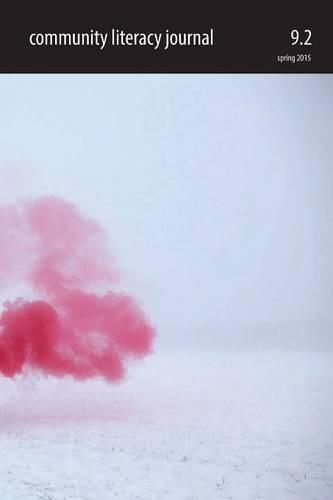Readings Newsletter
Become a Readings Member to make your shopping experience even easier.
Sign in or sign up for free!
You’re not far away from qualifying for FREE standard shipping within Australia
You’ve qualified for FREE standard shipping within Australia
The cart is loading…






This title is printed to order. This book may have been self-published. If so, we cannot guarantee the quality of the content. In the main most books will have gone through the editing process however some may not. We therefore suggest that you be aware of this before ordering this book. If in doubt check either the author or publisher’s details as we are unable to accept any returns unless they are faulty. Please contact us if you have any questions.
COMMUNITY LITERACY JOURNAL 9.2 (Spring 2015) The journal understands community literacy as the domain for literacy work that exists outside of mainstream educational and work institutions. It can be found in programs devoted to adult education, early childhood education, reading initiatives, lifelong learning, workplace literacy, or work with marginalized populations, but it can also be found in more informal, ad hoc projects. For COMMUNITY LITERACY JOURNAL, literacy is defined as the realm where attention is paid not just to content or to knowledge but to the symbolic means by which it is represented and used. Thus, literacy makes reference not just to letters and to text but to other multimodal and technological representations as well. We publish work that contributes to the field’s emerging methodologies and research agendas. CONTENTS: ARTICLES: Collaborative Complexities: Co-Authorship, Voice, and African American Rhetoric in Oral History Community Literacy Projects by Laurie Grobman, Meeghan Orr, Chris Meagher, Cassandra Yatron, and Jonathan Shelton Digital Literacy in Rural Women’s Lives by Jennie Vaughn, Allen Harrell, and Amy E. Dayton Transformative Learning, Affect, and Reciprocal Care in Community Engagement by Ashley J. Holmes Translingual Communities: Teaching and Learning Where You Don’t Know the Language by Elizabeth Kimball BOOK & NEW MEDIA REVIEWS: From the Book & New Media Review Editor’s Desk by Jessica Shumake Anthony D. Boynton, II and Saul Hernandez, Interns Keyword Essay: Ecology by Janine Morris After the Public Turn: Composition, Counterpublics, and the Citizen Bricoleur By Frank Farmer Reviewed by Jason Luther Phd to Ph.D.: How Education Saved My Life By Elaine B. Richardson Reviewed by Cynthia Delaney Del Otro Lado: Literacy and Migration across the U.S.-Mexico Border By Susan V. Meyers Reviewed by Anne-Marie Hall New Media Literacies and Participatory Popular Culture Across Borders By Bronwyn T. Williams and Amy A. Zenger, eds Reviewed by Jessica E. Slentz Street Sex Workers’ Discourse: Realizing Material Change through Agential Choice By Jill McCracken Reviewed by Angela Clark-Oates
$9.00 standard shipping within Australia
FREE standard shipping within Australia for orders over $100.00
Express & International shipping calculated at checkout
This title is printed to order. This book may have been self-published. If so, we cannot guarantee the quality of the content. In the main most books will have gone through the editing process however some may not. We therefore suggest that you be aware of this before ordering this book. If in doubt check either the author or publisher’s details as we are unable to accept any returns unless they are faulty. Please contact us if you have any questions.
COMMUNITY LITERACY JOURNAL 9.2 (Spring 2015) The journal understands community literacy as the domain for literacy work that exists outside of mainstream educational and work institutions. It can be found in programs devoted to adult education, early childhood education, reading initiatives, lifelong learning, workplace literacy, or work with marginalized populations, but it can also be found in more informal, ad hoc projects. For COMMUNITY LITERACY JOURNAL, literacy is defined as the realm where attention is paid not just to content or to knowledge but to the symbolic means by which it is represented and used. Thus, literacy makes reference not just to letters and to text but to other multimodal and technological representations as well. We publish work that contributes to the field’s emerging methodologies and research agendas. CONTENTS: ARTICLES: Collaborative Complexities: Co-Authorship, Voice, and African American Rhetoric in Oral History Community Literacy Projects by Laurie Grobman, Meeghan Orr, Chris Meagher, Cassandra Yatron, and Jonathan Shelton Digital Literacy in Rural Women’s Lives by Jennie Vaughn, Allen Harrell, and Amy E. Dayton Transformative Learning, Affect, and Reciprocal Care in Community Engagement by Ashley J. Holmes Translingual Communities: Teaching and Learning Where You Don’t Know the Language by Elizabeth Kimball BOOK & NEW MEDIA REVIEWS: From the Book & New Media Review Editor’s Desk by Jessica Shumake Anthony D. Boynton, II and Saul Hernandez, Interns Keyword Essay: Ecology by Janine Morris After the Public Turn: Composition, Counterpublics, and the Citizen Bricoleur By Frank Farmer Reviewed by Jason Luther Phd to Ph.D.: How Education Saved My Life By Elaine B. Richardson Reviewed by Cynthia Delaney Del Otro Lado: Literacy and Migration across the U.S.-Mexico Border By Susan V. Meyers Reviewed by Anne-Marie Hall New Media Literacies and Participatory Popular Culture Across Borders By Bronwyn T. Williams and Amy A. Zenger, eds Reviewed by Jessica E. Slentz Street Sex Workers’ Discourse: Realizing Material Change through Agential Choice By Jill McCracken Reviewed by Angela Clark-Oates